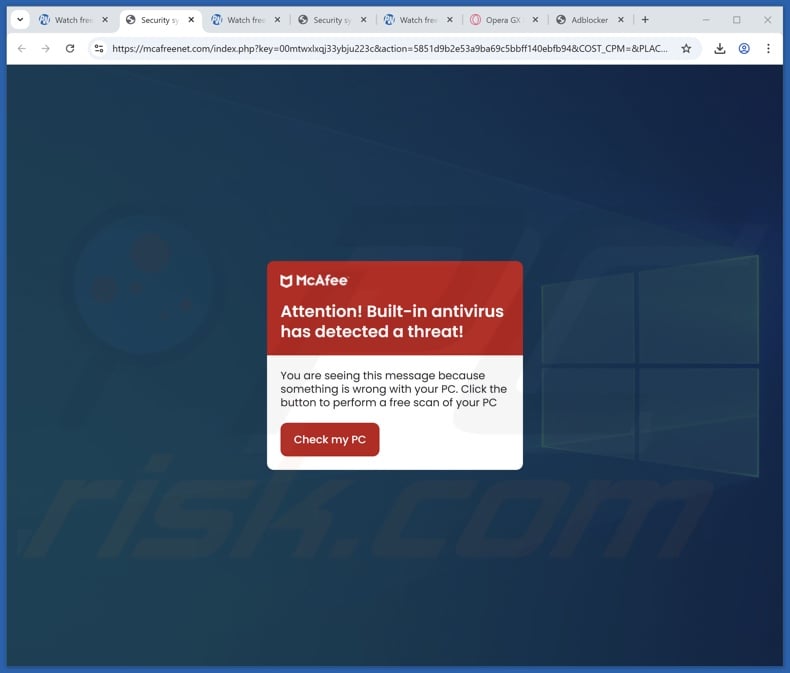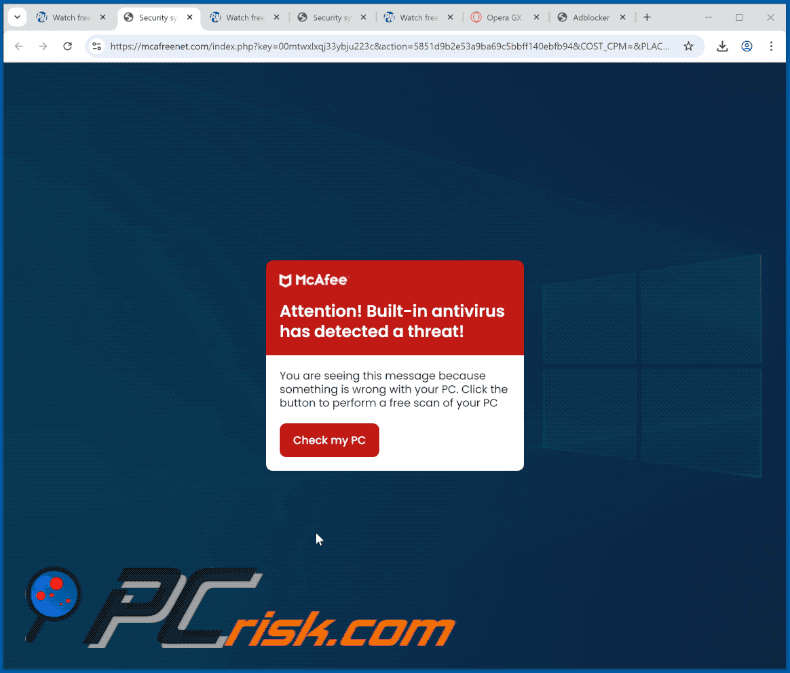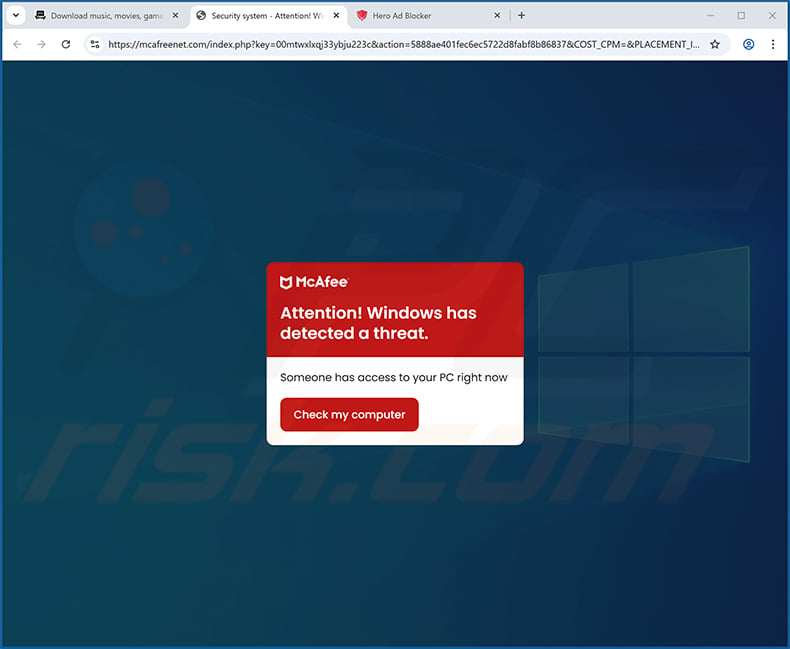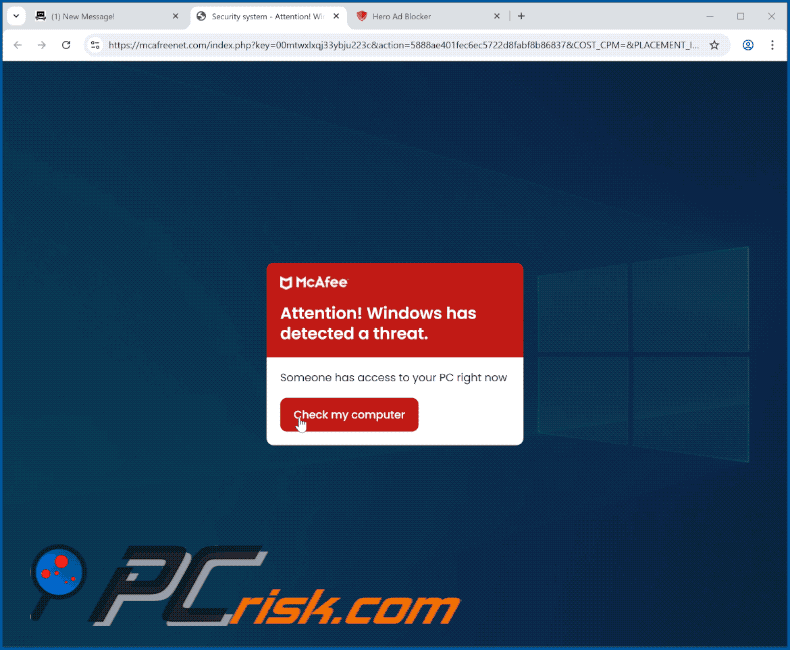How to avoid getting scammed by "McAfee - Built-in Antivirus Has Detected A Threat" sites
Phishing/ScamAlso Known As: "McAfee - Built-in Antivirus Has Detected A Threat" pop-up
Get free scan and check if your device is infected.
Remove it nowTo use full-featured product, you have to purchase a license for Combo Cleaner. Seven days free trial available. Combo Cleaner is owned and operated by RCS LT, the parent company of PCRisk.com.
What kind of scam is "McAfee - Built-in Antivirus Has Detected A Threat"?
While inspecting deceptive websites, our researchers discovered the "McAfee - Built-in Antivirus Has Detected A Threat" scam. It uses Windows and McAfee branding and claims the user's computer is infected. Typically, the goal is to deceive victims into installing or purchasing software. It must be emphasized that this scam is not associated with the actual Microsoft Corporation or McAfee Corp.

"McAfee - Built-in Antivirus Has Detected A Threat" scam overview
As mentioned in the introduction, this scam utilizes the color schemes, logos, and other branding of Windows and McAfee yet bears no association with either. "McAfee - Built-in Antivirus Has Detected A Threat" comprises multiple pop-up windows.
The first one claims that the user sees it because there is something wrong with their computer and recommends a free system scan. The second and third pop-ups question whether the user has witnessed strange mouse activity on their device, and the fourth one claims that someone has remote access to their computer.
The fifth window is an imitation of a system scan that keeps displaying pop-ups regarding detected threats. The sixth pop-up uses the same text as the "Your Computer Might Be Infected With Critical Viruses" scam – stating that the device is infected with seven critical viruses and urging users to run their "McAfee Total Protection" to eliminate these threats.
The seventh window is another fraudulent scan/repair process. The eighth one details the supposed viruses and associated risks. It encourages the user to reactivate their antivirus protection and offers a 55% discount.
It must be reiterated that all the information this scam provides is false. It must also be stressed that no website can detect viruses or other issues in visitors' devices.
At the time of research, "McAfee - Built-in Antivirus Has Detected A Threat" operated as an affiliate scam. Essentially, scammers seek to obtain illegitimate commissions by abusing the affiliate programs of genuine products or services. In this instance, "McAfee - Built-in Antivirus Has Detected A Threat" promoted McAfee's official site. However, there are no guarantees that an affiliate scam will continue to redirect to legitimate websites.
This type of lure is also commonly used to distribute untrustworthy, harmful, and even malicious software – such as fake antivirus tools, adware, browser hijackers, PUAs (Potentially Unwanted Applications), trojans, ransomware, and so forth. Threat-centered bait is utilized by phishing and technical support scams as well.
In summary, by trusting a scam like "McAfee - Built-in Antivirus Has Detected A Threat" – users can experience system infections, severe privacy issues, financial losses, and identity theft.
| Name | "McAfee - Built-in Antivirus Has Detected A Threat" pop-up |
| Threat Type | Phishing, Scam, Social Engineering, Fraud |
| Fake Claim | Computer is infected with multiple viruses. |
| Disguise | McAfee |
| Related Domains | mcafreenet[.]com |
| Detection Names | N/A (VirusTotal) |
| Serving IP Address | 148.251.1.142 |
| Symptoms | Fake error messages, fake system warnings, pop-up errors, hoax computer scan. |
| Distribution methods | Compromised websites, rogue online pop-up ads, potentially unwanted applications. |
| Damage | Loss of sensitive private information, monetary loss, identity theft, possible malware infections. |
| Malware Removal (Windows) |
To eliminate possible malware infections, scan your computer with legitimate antivirus software. Our security researchers recommend using Combo Cleaner. Download Combo CleanerTo use full-featured product, you have to purchase a license for Combo Cleaner. 7 days free trial available. Combo Cleaner is owned and operated by RCS LT, the parent company of PCRisk.com. |
Similar scam examples
We have investigated numerous online scams; "McAfee Online Scan Completed", "Avast Detected 18 Viruses", "7 Viruses Detected On Your PC Device", and "Norton Antivirus - Your Windows 10 Might Be Infected" are merely some of our latest articles on ones similar to "McAfee - Built-in Antivirus Has Detected A Threat".
The Internet is rife with scams, and they differ in appearance and modus operandi. Widespread lures concern system infections/threats, outdated software, website errors, shipping mishaps, product promotions, lotteries, giveaways, etc. Regardless of what a scam looks like or how it operates, the end goal is the same – to generate revenue at their victims' expense. Therefore, we strongly recommend vigilance when browsing.
How did I open a scam website?
The most common online scam promotion techniques include: sites utilizing rogue advertising networks, intrusive adverts, spam (e.g., emails, PMs/DMs, social media/ forum posts, SMSes, robocalls/ cold calls, browser notifications, etc.), mistyped URLs, and adware.
How to avoid visiting scam websites?
We strongly advise caution to ensure your online safety. Be wary of sites, ads, and messages that warn about severe issues or make incredible promises. Pay attention to URLs and enter them cautiously. Do not use websites offering pirated content (e.g., Torrenting, illegal streaming/downloading, etc.), as these webpages usually employ rogue advertising networks.
Do not permit dubious pages to deliver browser notifications; ignore or block their notification requests. Do not open attachments or links found in suspicious/irrelevant communications (e.g., emails, PMs/DMs, SMSes, etc.).
Download only from official/verified channels and be careful when installing (e.g., study terms and options, use "Custom/Advanced" settings, and opt out of additional apps, extensions, tools, etc.) – to prevent bundled/dangerous software (like adware) from infiltrating the system.
If your computer is already infected, we recommend running a scan with Combo Cleaner Antivirus for Windows to automatically eliminate all threats.
Appearance of the "McAfee - Built-in Antivirus Has Detected A Threat" pop-up scam (GIF):

Text presented in "McAfee - Built-in Antivirus Has Detected A Threat" scam:
Initial pop-up:
McAfee
Attention! Built-in antivirus has detected a threat!
You are seeing this message because something is wrong with your PC. Click the button to perform a free scan of your PC
----------------------
Second pop-up:
McAfee
Hidden threat monitoring mode
You are on the screen of the hidden threats check.
Here you can check the suspicious activity on your PC.What to do?
1. Make sure that there is only 1 cursor on your PC screen now mouse and it is yours.
2. If you see not only your cursor, then someone has hidden access to your PC.
Choose the appropriate response option.----------------------
Third pop-up:
McAfee
Hidden threat monitoring mode
What to do?
1. Move your mouse cursor over the black square.
2. If you notice unusual cursor behaviour inside the black square, it means that someone is currently watching your PC or is remotely connected to it.Choose the appropriate response option.
----------------------
Fourth pop-up:
McAfee
Hidden threat monitoring mode
Someone is currently viewing your data, passwords, and files
Based on your answers, we have identified a real threat to your PC.
Windows has detected several unauthorized connections to your PC
IP: 172.154.15.4 Time: Active now Device: Windows, Chrome Country: India Status: Successful login
IP: 154.170.488.45 Time: Active 14 hours ago Device: Windows, EDGE Country: India Status: Successful login
IP: 142.454.47.47 Time: Active 22 hours ago Device: Windows, Chrome Country: India Status: Successful loginTo quickly remove the virus, you need to scan your PC
----------------------
Sixth pop-up:
McAfee
Your computer infected with critical (7) viruses!
Warning
Your banking details, passwords, photos, and insurance numbers are in immediate danger right now! Immediate action is required!
Do not ignore this message and do not close the website! Your data may be stolen, which could lead to financial losses.
Please start your McAfee Total Protection to eliminate all threats
----------------------
Eighth pop-up:
McAfee
Warning! Your antivirus protection is not active!
Viruses found
Ransomware (High Risk) Win32/CryptoLocker.X9Zr...
Trojan.Gen.2 (High Risk) Win32/Melissa2023.Xi92
Trojan.Gen.2 (High Risk) Win32/Zeus.2023...
Russian Trojan (Ultra-High Risk) Win32/Mydoom.2023...
Warm (High Risk) Win32/Conficker.2jf9...
Russian Trojan (Ultra-High Risk) Win32/Pshtrm.Slmn...
Virus (Normal Risk) Win32/Trojan.H028hj...Your Antivirus Protection Has Expired
On September 7, 2025
7 viruses have been detected on your computer that steal your data and transmit it to malicious actors. After obtaining this data, a hacker or criminal can take out a loan in your name, use your insurance, clone your bank cards, use your email or social media accounts to solicit money from your acquaintances under your name, or blackmail you with your private photos or videos.
Warning
Even if you currently have McAfee antivirus installed, its license has expired, and in order to remove the viruses, you need to renew it! If you're not ready to renew the license now, unfortunately, the antivirus won't be able to remove the detected viruses - which means you are in danger! If you don't have an antivirus installed, please install one to protect yourself. Click the button below to get a license and remove the viruses.
55% Discount for Renew!
Another variant of "McAfee - Built-in Antivirus Has Detected A Threat" pop-up scam:

Text presented within:
McAfee
Attention! Windows has detected a threat.
Someone has access to your PC right now
[Check my computer]
Appearance of this pop-up variant (GIF):

Instant automatic malware removal:
Manual threat removal might be a lengthy and complicated process that requires advanced IT skills. Combo Cleaner is a professional automatic malware removal tool that is recommended to get rid of malware. Download it by clicking the button below:
DOWNLOAD Combo CleanerBy downloading any software listed on this website you agree to our Privacy Policy and Terms of Use. To use full-featured product, you have to purchase a license for Combo Cleaner. 7 days free trial available. Combo Cleaner is owned and operated by RCS LT, the parent company of PCRisk.com.
Quick menu:
- What is "McAfee - Built-in Antivirus Has Detected A Threat" pop-up?
- How to identify a pop-up scam?
- How do pop-up scams work?
- How to remove fake pop-ups?
- How to prevent fake pop-ups?
- What to do if you fell for a pop-up scam?
How to identify a pop-up scam?
Pop-up windows with various fake messages are a common type of lures cybercriminals use. They collect sensitive personal data, trick Internet users into calling fake tech support numbers, subscribe to useless online services, invest in shady cryptocurrency schemes, etc.
While in the majority of cases these pop-ups don't infect users' devices with malware, they can cause direct monetary loss or could result in identity theft.
Cybercriminals strive to create their rogue pop-up windows to look trustworthy, however, scams typically have the following characteristics:
- Spelling mistakes and non-professional images - Closely inspect the information displayed in a pop-up. Spelling mistakes and unprofessional images could be a sign of a scam.
- Sense of urgency - Countdown timer with a couple of minutes on it, asking you to enter your personal information or subscribe to some online service.
- Statements that you won something - If you haven't participated in a lottery, online competition, etc., and you see a pop-up window stating that you won.
- Computer or mobile device scan - A pop-up window that scans your device and informs of detected issues - is undoubtedly a scam; webpages cannot perform such actions.
- Exclusivity - Pop-up windows stating that only you are given secret access to a financial scheme that can quickly make you rich.
Example of a pop-up scam:

How do pop-up scams work?
Cybercriminals and deceptive marketers usually use various advertising networks, search engine poisoning techniques, and shady websites to generate traffic to their pop-ups. Users land on their online lures after clicking on fake download buttons, using a torrent website, or simply clicking on an Internet search engine result.
Based on users' location and device information, they are presented with a scam pop-up. Lures presented in such pop-ups range from get-rich-quick schemes to fake virus scans.
How to remove fake pop-ups?
In most cases, pop-up scams do not infect users' devices with malware. If you encountered a scam pop-up, simply closing it should be enough. In some cases scam, pop-ups may be hard to close; in such cases - close your Internet browser and restart it.
In extremely rare cases, you might need to reset your Internet browser. For this, use our instructions explaining how to reset Internet browser settings.
How to prevent fake pop-ups?
To prevent seeing pop-up scams, you should visit only reputable websites. Torrent, Crack, free online movie streaming, YouTube video download, and other websites of similar reputation commonly redirect Internet users to pop-up scams.
To minimize the risk of encountering pop-up scams, you should keep your Internet browsers up-to-date and use reputable anti-malware application. For this purpose, we recommend Combo Cleaner Antivirus for Windows.
What to do if you fell for a pop-up scam?
This depends on the type of scam that you fell for. Most commonly, pop-up scams try to trick users into sending money, giving away personal information, or giving access to one's device.
- If you sent money to scammers: You should contact your financial institution and explain that you were scammed. If informed promptly, there's a chance to get your money back.
- If you gave away your personal information: You should change your passwords and enable two-factor authentication in all online services that you use. Visit Federal Trade Commission to report identity theft and get personalized recovery steps.
- If you let scammers connect to your device: You should scan your computer with reputable anti-malware (we recommend Combo Cleaner Antivirus for Windows) - cyber criminals could have planted trojans, keyloggers, and other malware, don't use your computer until removing possible threats.
- Help other Internet users: report Internet scams to Federal Trade Commission.
Frequently Asked Questions (FAQ)
What is a pop-up scam?
Pop-up scams are a type of Web content that aims to deceive users into performing specific actions. For example, victims can be scared/enticed into downloading/installing software, purchasing products, subscribing to services, calling fake support lines, allowing cyber criminals to access devices remotely, sending money to scammers, providing sensitive data, etc.
What is the purpose of a pop-up scam?
Pop-up scams are designed to generate revenue for scammers. They predominantly profit by promoting content (e.g., sites, software, products, services, etc.), acquiring funds through deception, abusing/selling private information, and proliferating malware.
Why do I encounter fake pop-ups?
Pop-up scams are primarily endorsed via intrusive ads, webpages using rogue advertising networks, spam (e.g., emails, PMs/DMs, social media posts, browser notifications, etc.), mistyped URLs, and adware.
Will Combo Cleaner protect me from pop-up scams?
Combo Cleaner can scan visited websites and detect deceptive/malicious pages. Hence, should you happen upon such a webpage – Combo Cleaner will immediately warn you and restrict all further access to the site.
Share:

Tomas Meskauskas
Expert security researcher, professional malware analyst
I am passionate about computer security and technology. I have an experience of over 10 years working in various companies related to computer technical issue solving and Internet security. I have been working as an author and editor for pcrisk.com since 2010. Follow me on Twitter and LinkedIn to stay informed about the latest online security threats.
PCrisk security portal is brought by a company RCS LT.
Joined forces of security researchers help educate computer users about the latest online security threats. More information about the company RCS LT.
Our malware removal guides are free. However, if you want to support us you can send us a donation.
DonatePCrisk security portal is brought by a company RCS LT.
Joined forces of security researchers help educate computer users about the latest online security threats. More information about the company RCS LT.
Our malware removal guides are free. However, if you want to support us you can send us a donation.
Donate
▼ Show Discussion